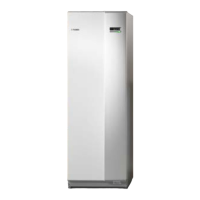General pipe
connections
Pipe installation must be carried out in accordance with
current norms and directives.
VVM 320 together with a compatible air/water heat
pump (See page 18) constitutes a complete installation
for heating and hot water.
The system requires the radiator circuit to be designed
for a low temperature heating medium. At lowest dimen-
sioned outdoor temperature, the highest recommended
temperatures are 55 °C on the supply line and 45 °C on
the return line, but VVM 320 can handle up to 65 °C.
Overflow water from the safety valve goes via an over-
flow cup to a drain so that hot water splashes cannot
cause injury. The entire length of the overflow water
pipe must be inclined to prevent water pockets, and
must also be frost-proof. The mouth of the overflow
water pipe must be visible and not located close to
electrical components.
NIBE recommends installing VVM 320 as close to the
heat pump as possible for optimum comfort. For further
information about the location of different components,
see section "Installation alternatives" in this manual.
Caution
Ensure that incoming water is clean. When
using a private well, it may be necessary to
supplement with an extra water filter.
NOTE
Any high points in the climate system, must
be equipped with air vents.
NOTE
The pipe systems need to be flushed out be-
fore the indoor module is connected so that
any debris cannot damage component parts.
NOTE
Switch (SF1) must not be moved to "" or " "
until VVM 320 has been filled with water.
Otherwise the temperature limiter, thermostat
and the immersion heater etc can be damaged.
NOTE
This installation is subject to building regulation
approval, notify the local Authority of intention
to install.
NOTE
Use only manufacturer’s recommended replace-
ment parts.
Waste water from the collection tray and from the safety
valves is led by a non-pressurised overflow pipe to the
drain so that hot water cannot cause damage. The
mouth of the overflow pipe must be visible and not
placed close to electrical components. In addition, the
opening of the overflow pipe (tundish), drain valves and
motorised valves should also be positioned away from
all electrical components. This is the only thing the non-
pressurised overflow pipe may be used for. Even over-
flow pipes from tundish connected to the expansion
relief valve must be connected to the drain in the same
way.
Please note that the connection of the T&P-valve should
not be used for any other purpose.
Valves may not be positioned between the expansion
valve and the vessel.
Overflow pipes from tundish must be routed with a fall
of at least 300 mm, before bends or angles in the pipe-
work (see image).
NIBE VVM 320Chapter 4 | Pipe connections14
4 Pipe connections

